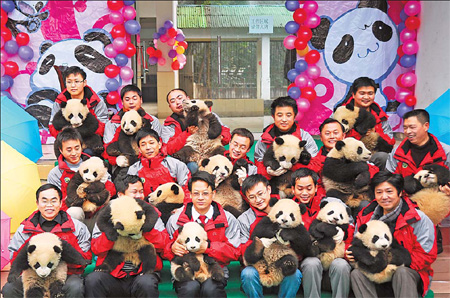Hot on the Web
Post-quake panda cubs move into nursery
By Huang Zhiling and Ou Ying (China Daily)
Updated: 2010-02-04 08:37
 |
Large Medium Small |
|
 Officials and keepers of the Bifengxia Base of the China Conservation and Research Center for the Giant Panda in Ya'an, Sichuan province, pose for a group photo with 16 panda cubs yesterday. [Huang Zhiling] |
Bears have diverse personalities, according to workers at the center
YA'AN, Sichuan: Although it was cold and overcast yesterday morning, some 70 people attending a brief ceremony marking the relocation of 16 panda cubs to a Sichuan province panda conservation nursery were all smiles.
At the time of the magnitude 8 earthquake on May 12, 2008, the pandas were kept at the CCRCGP Wolong Nature Reserve in Wenchuan county, Sichuan. One panda was killed and one is still missing.
Because the reserve was ruined, personnel evacuated all its pandas, transferring 32 to zoos in different parts of China and 77 to its Bifengxia Base.
From last February to May, more than 20 of the 77 pandas kept in captivity in the Bifengxia Base began to show interest in mating.
"Last year at the center we saw the largest number of pandas who were interested in mating," said Zhang Hemin, chief of the Wolong Nature Reserve Administrative Bureau and the conservation center.
As the Bifengxia Base and the Wolong Nature Reserve differ greatly in altitude and climate, and it was the first time pandas would be born in the Bifengxia Base, researchers tried their best to care for the would-be mothers traumatized by the quake and help them choose their favorite mating partners.
From last July to September, 13 pandas gave birth to 16 cubs - 10 female and six male cubs. Three pairs of twins were born.
"It was quite a success compared to 13 cubs born in the China Conservation and Research Center for the Giant Panda in 2008," Zhang Hemin said.
As the 16 cubs no longer need to rely solely on their mother's milk, Bifengxia Base staffers separated them from their mothers in the breeding center to the nursery with an area of 1,000 sq m. There, they live in the same den, said Zhou Yu, a leading caretaker in the base.
The cubs have diverse character traits. Some are naughty, and some are gentle. Some are greedy eaters or heavy sleepers, while others can walk quickly and climb up and down iron fences, said Zhou, 25, who majored in wild animal conservation before graduating from Xichang College in Sichuan four years ago. He has worked for the CCRCGP ever since.
The cubs' diet in the nursery is mainly milk. They learned how to eat carrots and bamboo shoots when their teeth were strong enough. They started eating bamboo when their deciduous teeth were replaced with permanent teeth at the age of 1, he said.
Zhou had faith the cubs could adapt to their new home as he and six other keepers in the nursery had given them brief trainings before they left their mothers.
Keepers monitored their weights, appetites and movements every day. The monitoring showed they remained in good health, Zhou said.
As of press time yesterday, all the cubs were sleeping soundly in the nursery.
"Only a few felt nervous after leaving their mothers, and some screamed at the sight of the other pandas. But most felt at ease and enjoyed the company of others," Zhou said.












